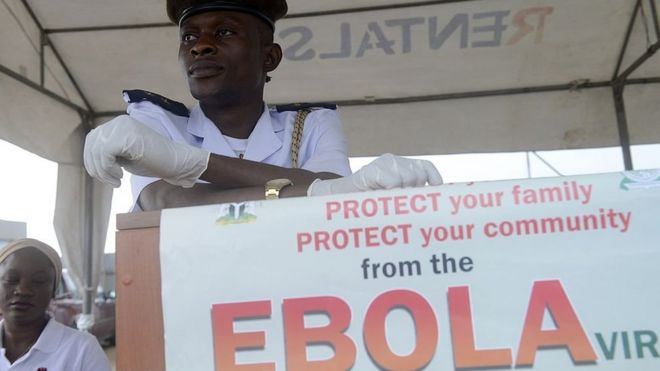
In October 2014, Nigeria received universal praise for its swift and efficient tackling of the Ebola pandemic which had struck West African neighbours Sierra Leone, Guinea and Liberia.
But the core team of staff from the Nigeria Centre for Disease Control (NCDC) who led the effort have since quit their jobs, because their salaries had not been paid for nearly three years.
"If they play back the clock, they won't get me to do that job again," says Dr Kenneth Madiebo, the 53-year-old medic who dealt with the body of Patrick Sawyer, the first identified Ebola case Nigeria in 2014.
A project officer with the NCDC since September 2012, Dr Madiebo was assigned the task of decontaminating the hospital room where Mr Sawyer had died in July 2014, and preparing his body for cremation.
In a video he showed me, Dr Madiebo, the only health official involved in the process, dons his protective gear and enters with a team of morticians to remove Mr Sawyer's naked body from the narrow toilet where he had died.
Mr Sawyer had been certified dead at 7:30 but the removal of his body took place at 23:30 that night.
"Everybody was afraid," said Dr Madiebo. "Nobody else wanted to do it. But I did it because it was my job."
"I was ill for days afterwards but it was more psychological, not Ebola."
Public praise came his way when Nigeria was officially declared Ebola-free on October 20, and the then Health Minister Onyebuchi Chukwu asked Dr Madiebo to stand up during a press conference and commended him openly for his key role in containing the virus.
That same month, the minister resigned his position to pursue other interests, while Dr Madiebo was promoted from project officer to incident manager, a position that came with a salary increase.
But, he has never received the new salary, or any other salary since then.
His colleague Colette Isu-Ezumah, a 43-year-old public health worker who moved back to Nigeria from the US in 2011, shares these frustrations.
She was a driving force behind the 250-strong group of Nigerian volunteers sent to Sierra Leone and Liberia for six months to help in the fight against Ebola, when infection rates were at their peak in 2014 and 2015.
'No right to email'
Despite this, and just like Dr Madiebo, Ms Isu-Ezumah has not been paid since October 2014."Our boss kept telling us not to worry, that we would eventually get paid," she says.
BBC, September 7, 2017
No comments:
Post a Comment